Combating Financial Crimes Through Ethics
VerifiedAdded on 2020/05/16
|10
|2354
|56
AI Summary
This assignment delves into the issue of financial crimes, particularly white-collar crime, and examines the crucial role ethics plays in mitigating these issues. It discusses how ethical leadership and organizational culture can contribute to a decrease in fraudulent activities. The paper analyzes various methods used to detect and prevent fraud, highlighting the importance of awareness, internal controls, and legal frameworks. Furthermore, it explores the limitations of traditional criminal justice systems in addressing white-collar crime and emphasizes the proactive approach offered by ethics and good governance.
Contribute Materials
Your contribution can guide someone’s learning journey. Share your
documents today.
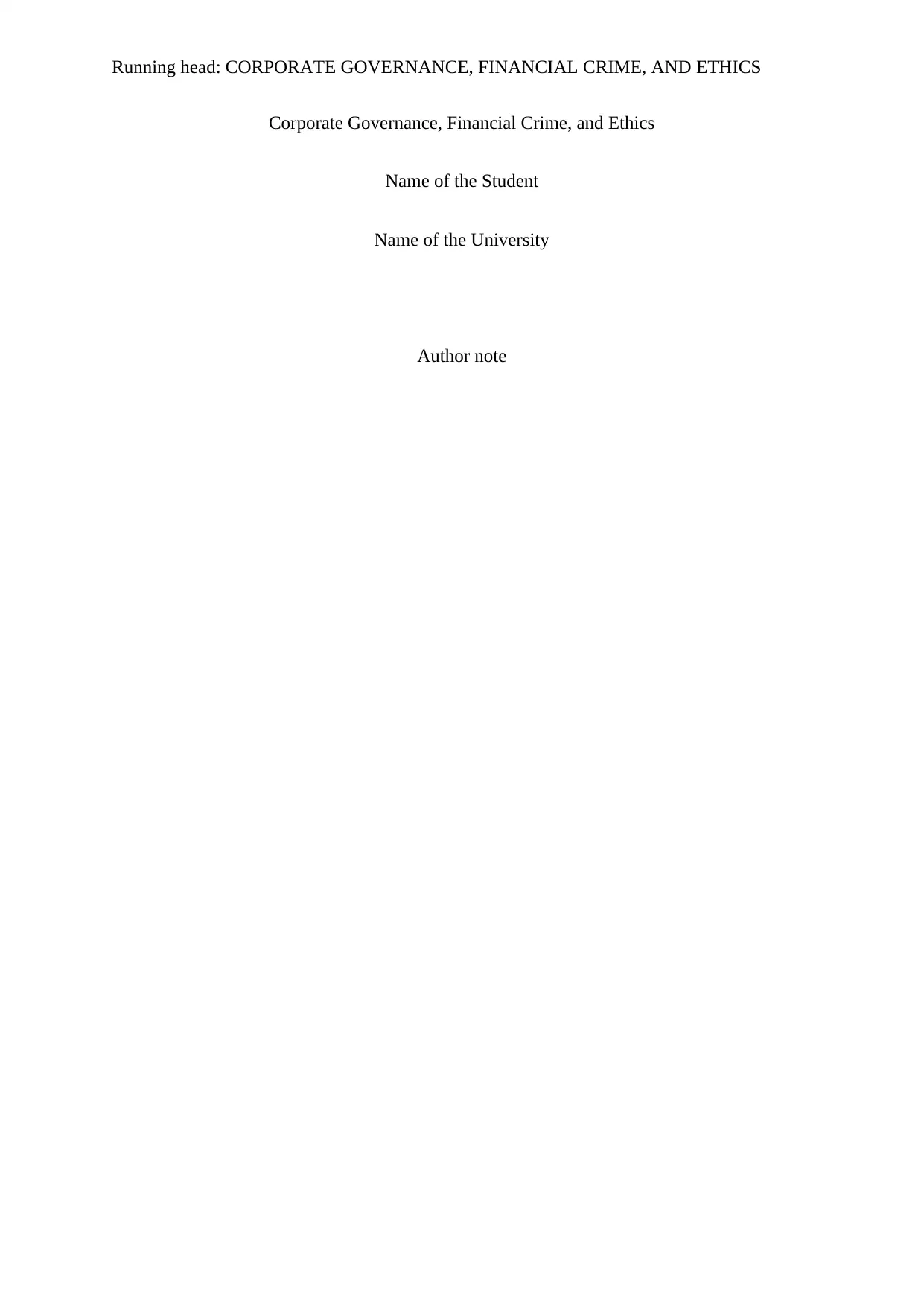
Running head: CORPORATE GOVERNANCE, FINANCIAL CRIME, AND ETHICS
Corporate Governance, Financial Crime, and Ethics
Name of the Student
Name of the University
Author note
Corporate Governance, Financial Crime, and Ethics
Name of the Student
Name of the University
Author note
Secure Best Marks with AI Grader
Need help grading? Try our AI Grader for instant feedback on your assignments.
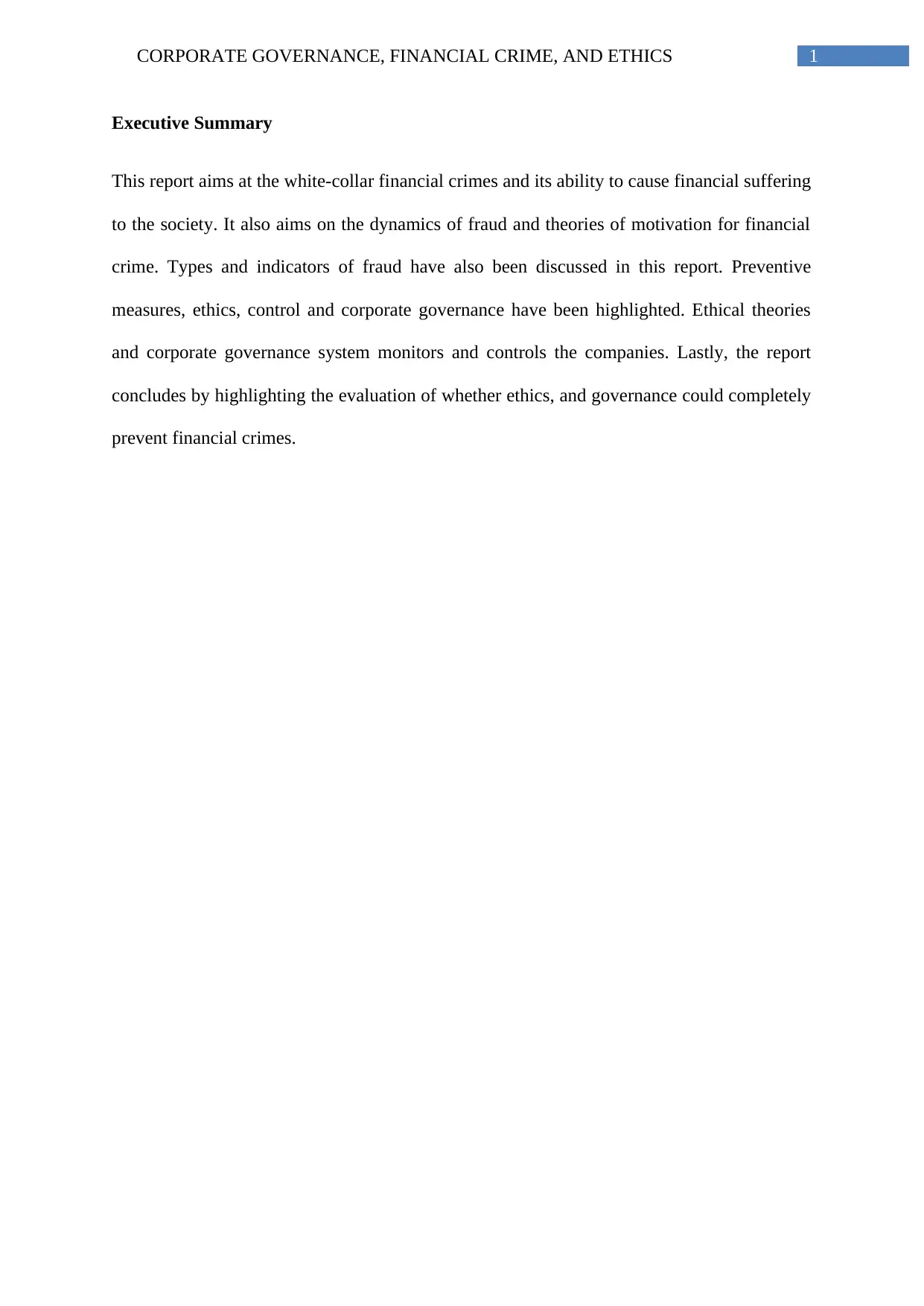
1CORPORATE GOVERNANCE, FINANCIAL CRIME, AND ETHICS
Executive Summary
This report aims at the white-collar financial crimes and its ability to cause financial suffering
to the society. It also aims on the dynamics of fraud and theories of motivation for financial
crime. Types and indicators of fraud have also been discussed in this report. Preventive
measures, ethics, control and corporate governance have been highlighted. Ethical theories
and corporate governance system monitors and controls the companies. Lastly, the report
concludes by highlighting the evaluation of whether ethics, and governance could completely
prevent financial crimes.
Executive Summary
This report aims at the white-collar financial crimes and its ability to cause financial suffering
to the society. It also aims on the dynamics of fraud and theories of motivation for financial
crime. Types and indicators of fraud have also been discussed in this report. Preventive
measures, ethics, control and corporate governance have been highlighted. Ethical theories
and corporate governance system monitors and controls the companies. Lastly, the report
concludes by highlighting the evaluation of whether ethics, and governance could completely
prevent financial crimes.
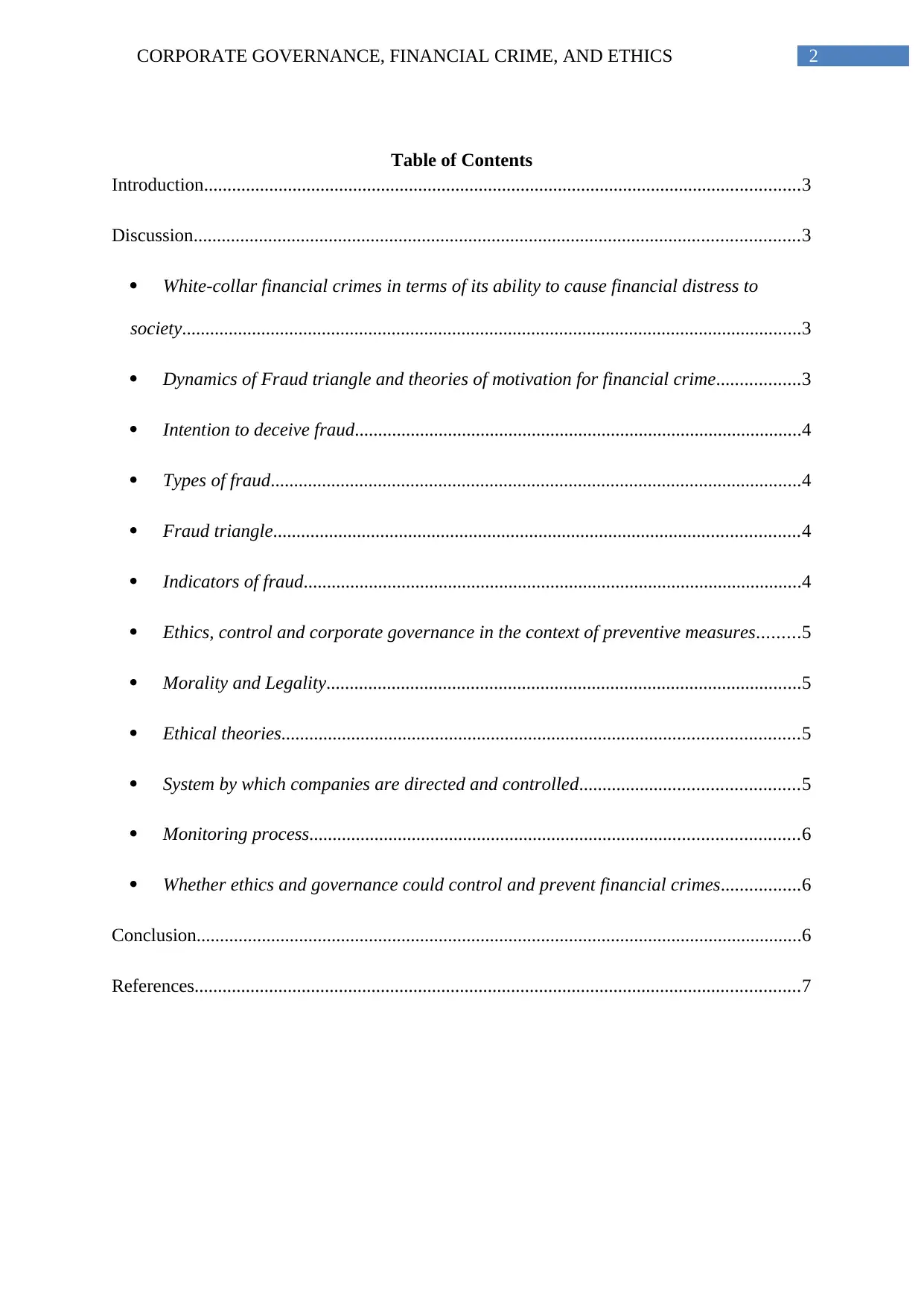
2CORPORATE GOVERNANCE, FINANCIAL CRIME, AND ETHICS
Table of Contents
Introduction................................................................................................................................3
Discussion..................................................................................................................................3
White-collar financial crimes in terms of its ability to cause financial distress to
society.....................................................................................................................................3
Dynamics of Fraud triangle and theories of motivation for financial crime..................3
Intention to deceive fraud................................................................................................4
Types of fraud..................................................................................................................4
Fraud triangle.................................................................................................................4
Indicators of fraud...........................................................................................................4
Ethics, control and corporate governance in the context of preventive measures.........5
Morality and Legality......................................................................................................5
Ethical theories...............................................................................................................5
System by which companies are directed and controlled...............................................5
Monitoring process.........................................................................................................6
Whether ethics and governance could control and prevent financial crimes.................6
Conclusion..................................................................................................................................6
References..................................................................................................................................7
Table of Contents
Introduction................................................................................................................................3
Discussion..................................................................................................................................3
White-collar financial crimes in terms of its ability to cause financial distress to
society.....................................................................................................................................3
Dynamics of Fraud triangle and theories of motivation for financial crime..................3
Intention to deceive fraud................................................................................................4
Types of fraud..................................................................................................................4
Fraud triangle.................................................................................................................4
Indicators of fraud...........................................................................................................4
Ethics, control and corporate governance in the context of preventive measures.........5
Morality and Legality......................................................................................................5
Ethical theories...............................................................................................................5
System by which companies are directed and controlled...............................................5
Monitoring process.........................................................................................................6
Whether ethics and governance could control and prevent financial crimes.................6
Conclusion..................................................................................................................................6
References..................................................................................................................................7
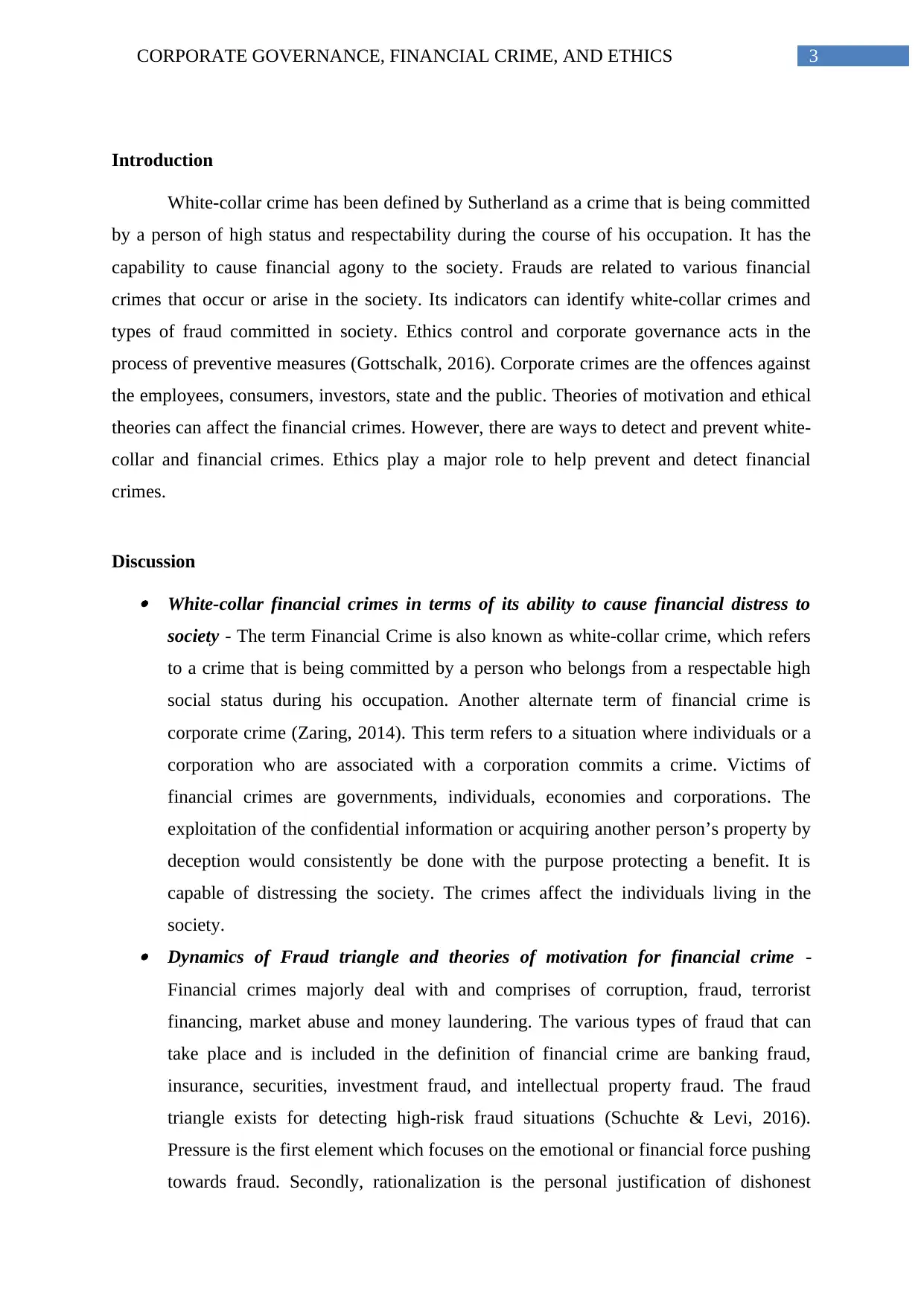
3CORPORATE GOVERNANCE, FINANCIAL CRIME, AND ETHICS
Introduction
White-collar crime has been defined by Sutherland as a crime that is being committed
by a person of high status and respectability during the course of his occupation. It has the
capability to cause financial agony to the society. Frauds are related to various financial
crimes that occur or arise in the society. Its indicators can identify white-collar crimes and
types of fraud committed in society. Ethics control and corporate governance acts in the
process of preventive measures (Gottschalk, 2016). Corporate crimes are the offences against
the employees, consumers, investors, state and the public. Theories of motivation and ethical
theories can affect the financial crimes. However, there are ways to detect and prevent white-
collar and financial crimes. Ethics play a major role to help prevent and detect financial
crimes.
Discussion White-collar financial crimes in terms of its ability to cause financial distress to
society - The term Financial Crime is also known as white-collar crime, which refers
to a crime that is being committed by a person who belongs from a respectable high
social status during his occupation. Another alternate term of financial crime is
corporate crime (Zaring, 2014). This term refers to a situation where individuals or a
corporation who are associated with a corporation commits a crime. Victims of
financial crimes are governments, individuals, economies and corporations. The
exploitation of the confidential information or acquiring another person’s property by
deception would consistently be done with the purpose protecting a benefit. It is
capable of distressing the society. The crimes affect the individuals living in the
society. Dynamics of Fraud triangle and theories of motivation for financial crime -
Financial crimes majorly deal with and comprises of corruption, fraud, terrorist
financing, market abuse and money laundering. The various types of fraud that can
take place and is included in the definition of financial crime are banking fraud,
insurance, securities, investment fraud, and intellectual property fraud. The fraud
triangle exists for detecting high-risk fraud situations (Schuchte & Levi, 2016).
Pressure is the first element which focuses on the emotional or financial force pushing
towards fraud. Secondly, rationalization is the personal justification of dishonest
Introduction
White-collar crime has been defined by Sutherland as a crime that is being committed
by a person of high status and respectability during the course of his occupation. It has the
capability to cause financial agony to the society. Frauds are related to various financial
crimes that occur or arise in the society. Its indicators can identify white-collar crimes and
types of fraud committed in society. Ethics control and corporate governance acts in the
process of preventive measures (Gottschalk, 2016). Corporate crimes are the offences against
the employees, consumers, investors, state and the public. Theories of motivation and ethical
theories can affect the financial crimes. However, there are ways to detect and prevent white-
collar and financial crimes. Ethics play a major role to help prevent and detect financial
crimes.
Discussion White-collar financial crimes in terms of its ability to cause financial distress to
society - The term Financial Crime is also known as white-collar crime, which refers
to a crime that is being committed by a person who belongs from a respectable high
social status during his occupation. Another alternate term of financial crime is
corporate crime (Zaring, 2014). This term refers to a situation where individuals or a
corporation who are associated with a corporation commits a crime. Victims of
financial crimes are governments, individuals, economies and corporations. The
exploitation of the confidential information or acquiring another person’s property by
deception would consistently be done with the purpose protecting a benefit. It is
capable of distressing the society. The crimes affect the individuals living in the
society. Dynamics of Fraud triangle and theories of motivation for financial crime -
Financial crimes majorly deal with and comprises of corruption, fraud, terrorist
financing, market abuse and money laundering. The various types of fraud that can
take place and is included in the definition of financial crime are banking fraud,
insurance, securities, investment fraud, and intellectual property fraud. The fraud
triangle exists for detecting high-risk fraud situations (Schuchte & Levi, 2016).
Pressure is the first element which focuses on the emotional or financial force pushing
towards fraud. Secondly, rationalization is the personal justification of dishonest
Secure Best Marks with AI Grader
Need help grading? Try our AI Grader for instant feedback on your assignments.
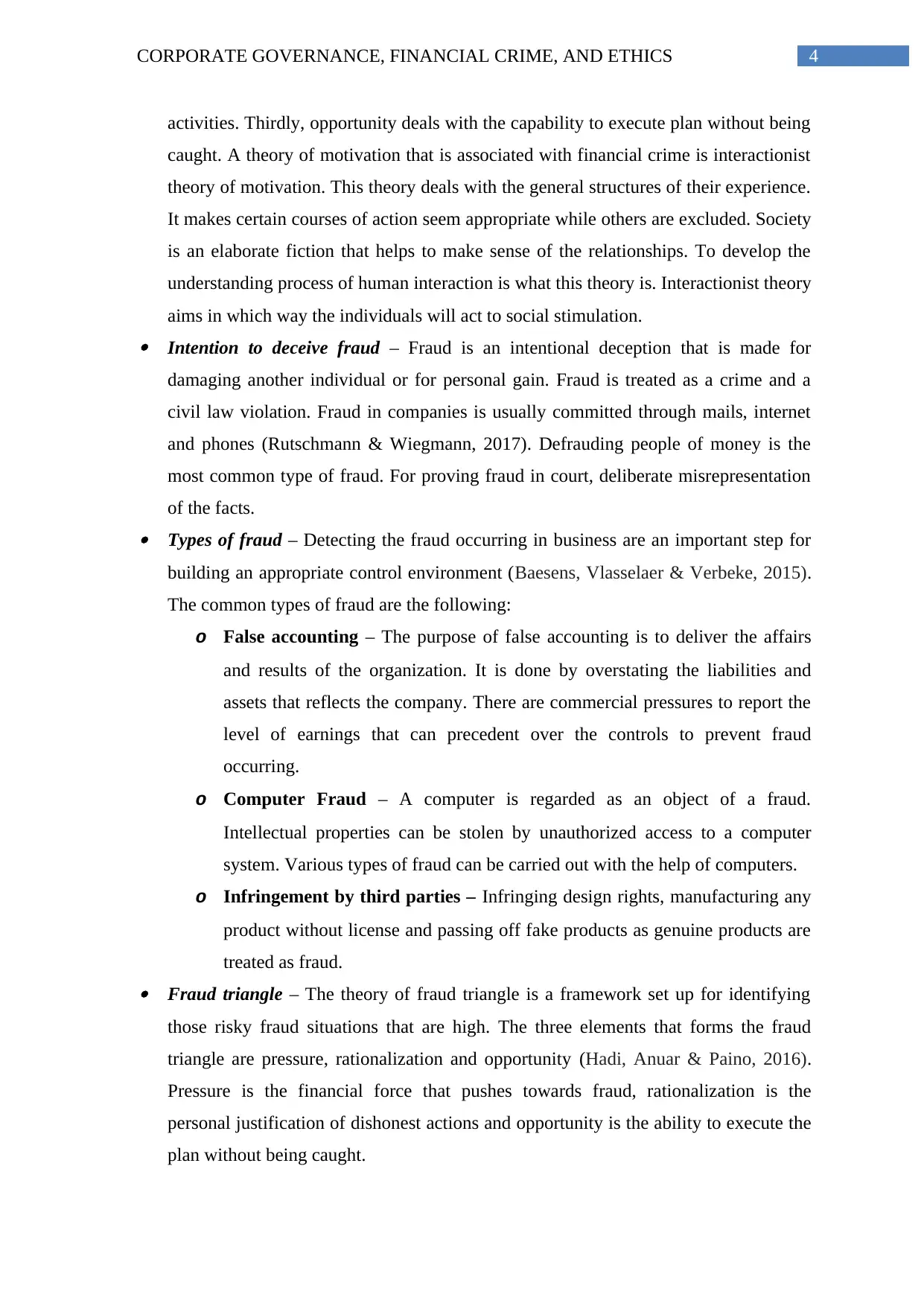
4CORPORATE GOVERNANCE, FINANCIAL CRIME, AND ETHICS
activities. Thirdly, opportunity deals with the capability to execute plan without being
caught. A theory of motivation that is associated with financial crime is interactionist
theory of motivation. This theory deals with the general structures of their experience.
It makes certain courses of action seem appropriate while others are excluded. Society
is an elaborate fiction that helps to make sense of the relationships. To develop the
understanding process of human interaction is what this theory is. Interactionist theory
aims in which way the individuals will act to social stimulation. Intention to deceive fraud – Fraud is an intentional deception that is made for
damaging another individual or for personal gain. Fraud is treated as a crime and a
civil law violation. Fraud in companies is usually committed through mails, internet
and phones (Rutschmann & Wiegmann, 2017). Defrauding people of money is the
most common type of fraud. For proving fraud in court, deliberate misrepresentation
of the facts. Types of fraud – Detecting the fraud occurring in business are an important step for
building an appropriate control environment (Baesens, Vlasselaer & Verbeke, 2015).
The common types of fraud are the following:
o False accounting – The purpose of false accounting is to deliver the affairs
and results of the organization. It is done by overstating the liabilities and
assets that reflects the company. There are commercial pressures to report the
level of earnings that can precedent over the controls to prevent fraud
occurring.
o Computer Fraud – A computer is regarded as an object of a fraud.
Intellectual properties can be stolen by unauthorized access to a computer
system. Various types of fraud can be carried out with the help of computers.
o Infringement by third parties – Infringing design rights, manufacturing any
product without license and passing off fake products as genuine products are
treated as fraud. Fraud triangle – The theory of fraud triangle is a framework set up for identifying
those risky fraud situations that are high. The three elements that forms the fraud
triangle are pressure, rationalization and opportunity (Hadi, Anuar & Paino, 2016).
Pressure is the financial force that pushes towards fraud, rationalization is the
personal justification of dishonest actions and opportunity is the ability to execute the
plan without being caught.
activities. Thirdly, opportunity deals with the capability to execute plan without being
caught. A theory of motivation that is associated with financial crime is interactionist
theory of motivation. This theory deals with the general structures of their experience.
It makes certain courses of action seem appropriate while others are excluded. Society
is an elaborate fiction that helps to make sense of the relationships. To develop the
understanding process of human interaction is what this theory is. Interactionist theory
aims in which way the individuals will act to social stimulation. Intention to deceive fraud – Fraud is an intentional deception that is made for
damaging another individual or for personal gain. Fraud is treated as a crime and a
civil law violation. Fraud in companies is usually committed through mails, internet
and phones (Rutschmann & Wiegmann, 2017). Defrauding people of money is the
most common type of fraud. For proving fraud in court, deliberate misrepresentation
of the facts. Types of fraud – Detecting the fraud occurring in business are an important step for
building an appropriate control environment (Baesens, Vlasselaer & Verbeke, 2015).
The common types of fraud are the following:
o False accounting – The purpose of false accounting is to deliver the affairs
and results of the organization. It is done by overstating the liabilities and
assets that reflects the company. There are commercial pressures to report the
level of earnings that can precedent over the controls to prevent fraud
occurring.
o Computer Fraud – A computer is regarded as an object of a fraud.
Intellectual properties can be stolen by unauthorized access to a computer
system. Various types of fraud can be carried out with the help of computers.
o Infringement by third parties – Infringing design rights, manufacturing any
product without license and passing off fake products as genuine products are
treated as fraud. Fraud triangle – The theory of fraud triangle is a framework set up for identifying
those risky fraud situations that are high. The three elements that forms the fraud
triangle are pressure, rationalization and opportunity (Hadi, Anuar & Paino, 2016).
Pressure is the financial force that pushes towards fraud, rationalization is the
personal justification of dishonest actions and opportunity is the ability to execute the
plan without being caught.
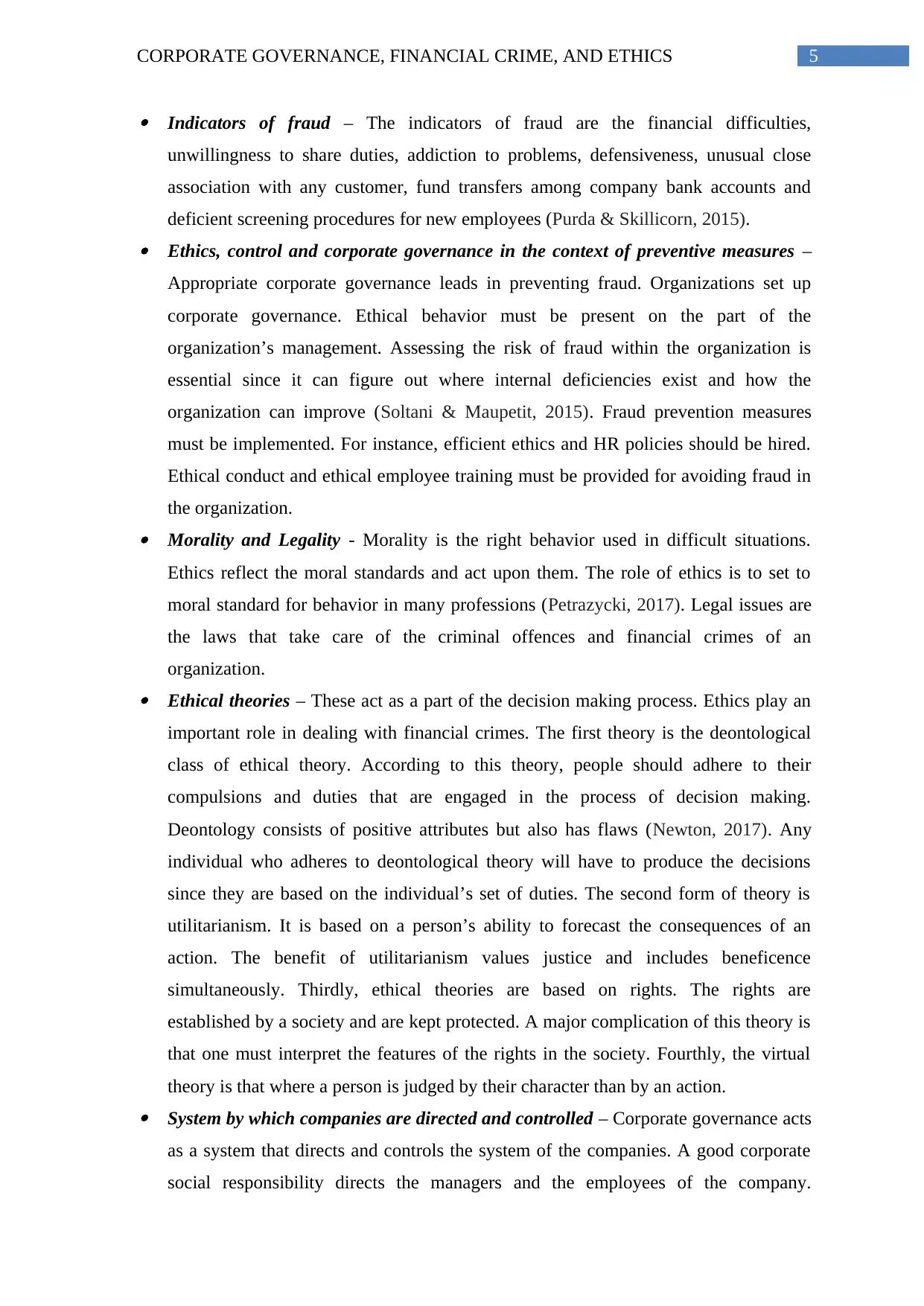
5CORPORATE GOVERNANCE, FINANCIAL CRIME, AND ETHICS
Indicators of fraud – The indicators of fraud are the financial difficulties,
unwillingness to share duties, addiction to problems, defensiveness, unusual close
association with any customer, fund transfers among company bank accounts and
deficient screening procedures for new employees (Purda & Skillicorn, 2015). Ethics, control and corporate governance in the context of preventive measures –
Appropriate corporate governance leads in preventing fraud. Organizations set up
corporate governance. Ethical behavior must be present on the part of the
organization’s management. Assessing the risk of fraud within the organization is
essential since it can figure out where internal deficiencies exist and how the
organization can improve (Soltani & Maupetit, 2015). Fraud prevention measures
must be implemented. For instance, efficient ethics and HR policies should be hired.
Ethical conduct and ethical employee training must be provided for avoiding fraud in
the organization. Morality and Legality - Morality is the right behavior used in difficult situations.
Ethics reflect the moral standards and act upon them. The role of ethics is to set to
moral standard for behavior in many professions (Petrazycki, 2017). Legal issues are
the laws that take care of the criminal offences and financial crimes of an
organization. Ethical theories – These act as a part of the decision making process. Ethics play an
important role in dealing with financial crimes. The first theory is the deontological
class of ethical theory. According to this theory, people should adhere to their
compulsions and duties that are engaged in the process of decision making.
Deontology consists of positive attributes but also has flaws (Newton, 2017). Any
individual who adheres to deontological theory will have to produce the decisions
since they are based on the individual’s set of duties. The second form of theory is
utilitarianism. It is based on a person’s ability to forecast the consequences of an
action. The benefit of utilitarianism values justice and includes beneficence
simultaneously. Thirdly, ethical theories are based on rights. The rights are
established by a society and are kept protected. A major complication of this theory is
that one must interpret the features of the rights in the society. Fourthly, the virtual
theory is that where a person is judged by their character than by an action. System by which companies are directed and controlled – Corporate governance acts
as a system that directs and controls the system of the companies. A good corporate
social responsibility directs the managers and the employees of the company.
Indicators of fraud – The indicators of fraud are the financial difficulties,
unwillingness to share duties, addiction to problems, defensiveness, unusual close
association with any customer, fund transfers among company bank accounts and
deficient screening procedures for new employees (Purda & Skillicorn, 2015). Ethics, control and corporate governance in the context of preventive measures –
Appropriate corporate governance leads in preventing fraud. Organizations set up
corporate governance. Ethical behavior must be present on the part of the
organization’s management. Assessing the risk of fraud within the organization is
essential since it can figure out where internal deficiencies exist and how the
organization can improve (Soltani & Maupetit, 2015). Fraud prevention measures
must be implemented. For instance, efficient ethics and HR policies should be hired.
Ethical conduct and ethical employee training must be provided for avoiding fraud in
the organization. Morality and Legality - Morality is the right behavior used in difficult situations.
Ethics reflect the moral standards and act upon them. The role of ethics is to set to
moral standard for behavior in many professions (Petrazycki, 2017). Legal issues are
the laws that take care of the criminal offences and financial crimes of an
organization. Ethical theories – These act as a part of the decision making process. Ethics play an
important role in dealing with financial crimes. The first theory is the deontological
class of ethical theory. According to this theory, people should adhere to their
compulsions and duties that are engaged in the process of decision making.
Deontology consists of positive attributes but also has flaws (Newton, 2017). Any
individual who adheres to deontological theory will have to produce the decisions
since they are based on the individual’s set of duties. The second form of theory is
utilitarianism. It is based on a person’s ability to forecast the consequences of an
action. The benefit of utilitarianism values justice and includes beneficence
simultaneously. Thirdly, ethical theories are based on rights. The rights are
established by a society and are kept protected. A major complication of this theory is
that one must interpret the features of the rights in the society. Fourthly, the virtual
theory is that where a person is judged by their character than by an action. System by which companies are directed and controlled – Corporate governance acts
as a system that directs and controls the system of the companies. A good corporate
social responsibility directs the managers and the employees of the company.
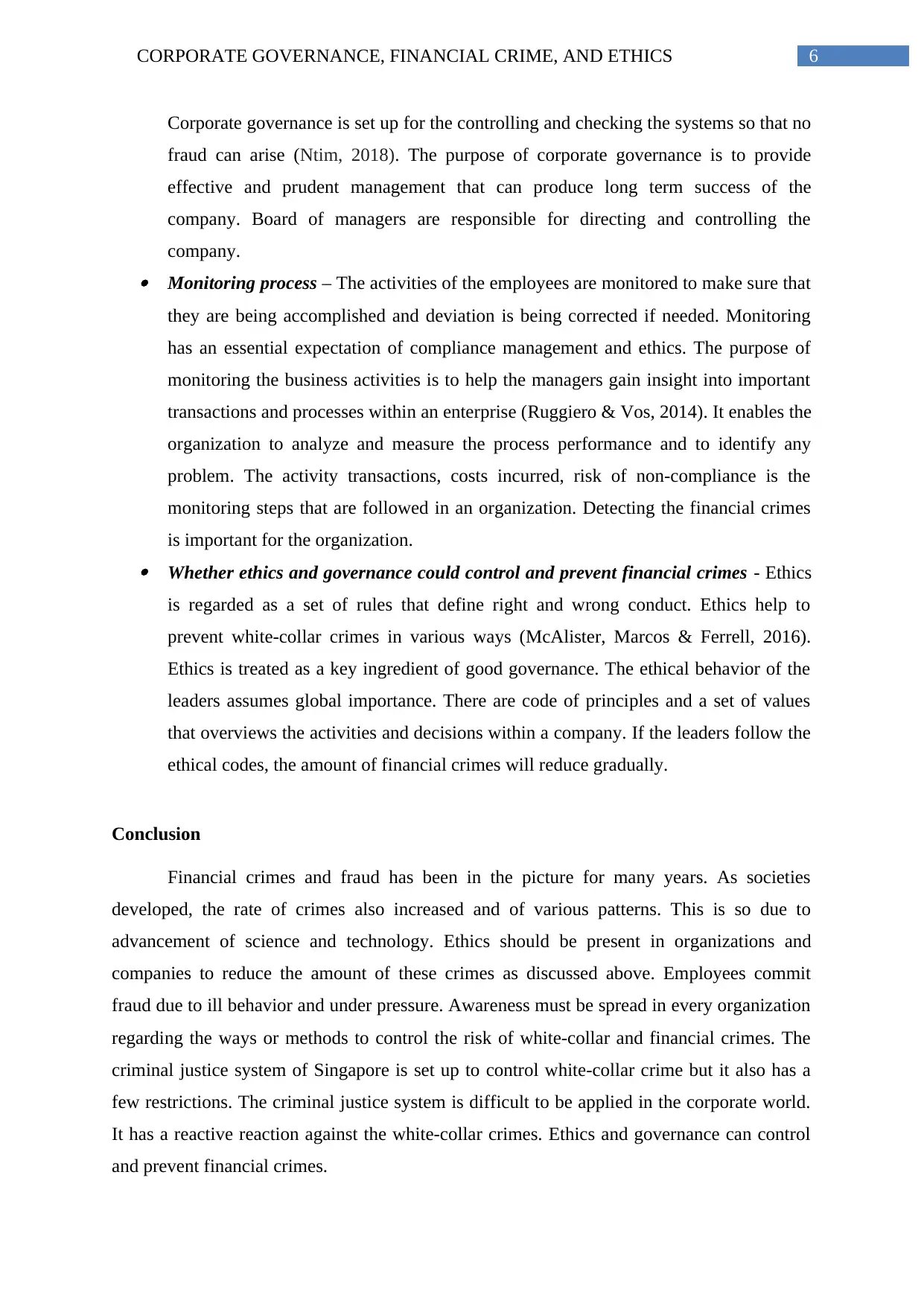
6CORPORATE GOVERNANCE, FINANCIAL CRIME, AND ETHICS
Corporate governance is set up for the controlling and checking the systems so that no
fraud can arise (Ntim, 2018). The purpose of corporate governance is to provide
effective and prudent management that can produce long term success of the
company. Board of managers are responsible for directing and controlling the
company. Monitoring process – The activities of the employees are monitored to make sure that
they are being accomplished and deviation is being corrected if needed. Monitoring
has an essential expectation of compliance management and ethics. The purpose of
monitoring the business activities is to help the managers gain insight into important
transactions and processes within an enterprise (Ruggiero & Vos, 2014). It enables the
organization to analyze and measure the process performance and to identify any
problem. The activity transactions, costs incurred, risk of non-compliance is the
monitoring steps that are followed in an organization. Detecting the financial crimes
is important for the organization. Whether ethics and governance could control and prevent financial crimes - Ethics
is regarded as a set of rules that define right and wrong conduct. Ethics help to
prevent white-collar crimes in various ways (McAlister, Marcos & Ferrell, 2016).
Ethics is treated as a key ingredient of good governance. The ethical behavior of the
leaders assumes global importance. There are code of principles and a set of values
that overviews the activities and decisions within a company. If the leaders follow the
ethical codes, the amount of financial crimes will reduce gradually.
Conclusion
Financial crimes and fraud has been in the picture for many years. As societies
developed, the rate of crimes also increased and of various patterns. This is so due to
advancement of science and technology. Ethics should be present in organizations and
companies to reduce the amount of these crimes as discussed above. Employees commit
fraud due to ill behavior and under pressure. Awareness must be spread in every organization
regarding the ways or methods to control the risk of white-collar and financial crimes. The
criminal justice system of Singapore is set up to control white-collar crime but it also has a
few restrictions. The criminal justice system is difficult to be applied in the corporate world.
It has a reactive reaction against the white-collar crimes. Ethics and governance can control
and prevent financial crimes.
Corporate governance is set up for the controlling and checking the systems so that no
fraud can arise (Ntim, 2018). The purpose of corporate governance is to provide
effective and prudent management that can produce long term success of the
company. Board of managers are responsible for directing and controlling the
company. Monitoring process – The activities of the employees are monitored to make sure that
they are being accomplished and deviation is being corrected if needed. Monitoring
has an essential expectation of compliance management and ethics. The purpose of
monitoring the business activities is to help the managers gain insight into important
transactions and processes within an enterprise (Ruggiero & Vos, 2014). It enables the
organization to analyze and measure the process performance and to identify any
problem. The activity transactions, costs incurred, risk of non-compliance is the
monitoring steps that are followed in an organization. Detecting the financial crimes
is important for the organization. Whether ethics and governance could control and prevent financial crimes - Ethics
is regarded as a set of rules that define right and wrong conduct. Ethics help to
prevent white-collar crimes in various ways (McAlister, Marcos & Ferrell, 2016).
Ethics is treated as a key ingredient of good governance. The ethical behavior of the
leaders assumes global importance. There are code of principles and a set of values
that overviews the activities and decisions within a company. If the leaders follow the
ethical codes, the amount of financial crimes will reduce gradually.
Conclusion
Financial crimes and fraud has been in the picture for many years. As societies
developed, the rate of crimes also increased and of various patterns. This is so due to
advancement of science and technology. Ethics should be present in organizations and
companies to reduce the amount of these crimes as discussed above. Employees commit
fraud due to ill behavior and under pressure. Awareness must be spread in every organization
regarding the ways or methods to control the risk of white-collar and financial crimes. The
criminal justice system of Singapore is set up to control white-collar crime but it also has a
few restrictions. The criminal justice system is difficult to be applied in the corporate world.
It has a reactive reaction against the white-collar crimes. Ethics and governance can control
and prevent financial crimes.
Paraphrase This Document
Need a fresh take? Get an instant paraphrase of this document with our AI Paraphraser
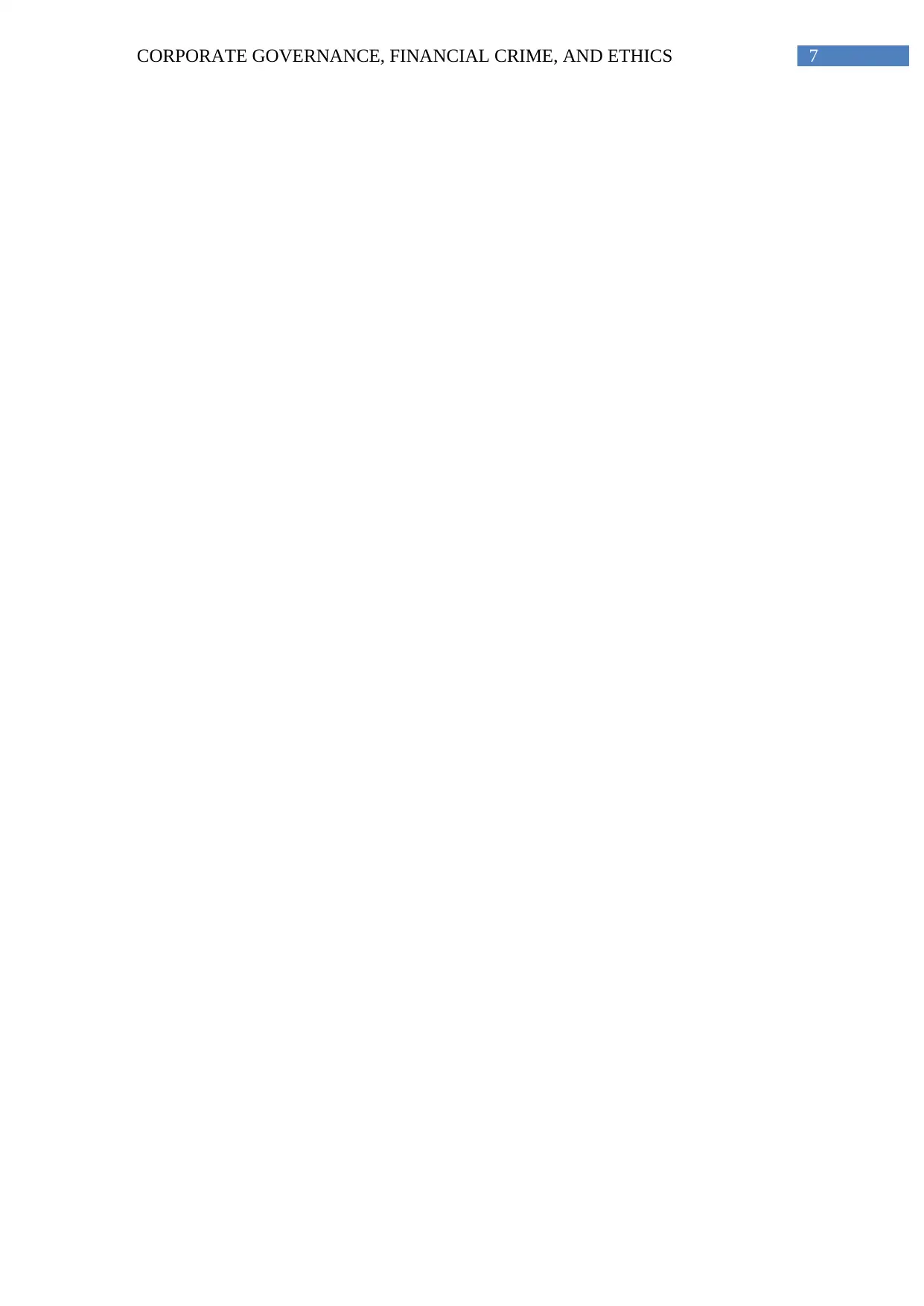
7CORPORATE GOVERNANCE, FINANCIAL CRIME, AND ETHICS
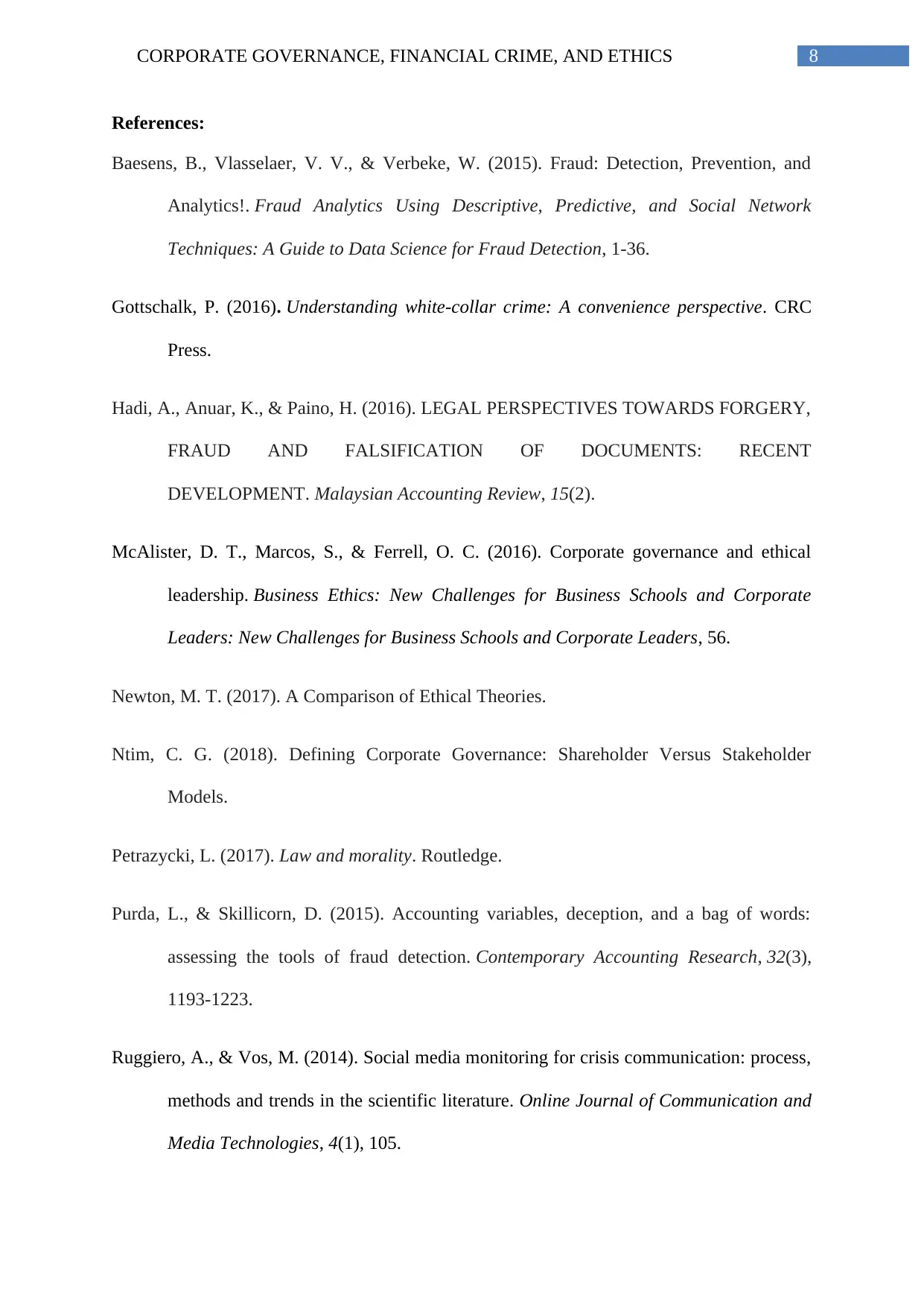
8CORPORATE GOVERNANCE, FINANCIAL CRIME, AND ETHICS
References:
Baesens, B., Vlasselaer, V. V., & Verbeke, W. (2015). Fraud: Detection, Prevention, and
Analytics!. Fraud Analytics Using Descriptive, Predictive, and Social Network
Techniques: A Guide to Data Science for Fraud Detection, 1-36.
Gottschalk, P. (2016). Understanding white-collar crime: A convenience perspective. CRC
Press.
Hadi, A., Anuar, K., & Paino, H. (2016). LEGAL PERSPECTIVES TOWARDS FORGERY,
FRAUD AND FALSIFICATION OF DOCUMENTS: RECENT
DEVELOPMENT. Malaysian Accounting Review, 15(2).
McAlister, D. T., Marcos, S., & Ferrell, O. C. (2016). Corporate governance and ethical
leadership. Business Ethics: New Challenges for Business Schools and Corporate
Leaders: New Challenges for Business Schools and Corporate Leaders, 56.
Newton, M. T. (2017). A Comparison of Ethical Theories.
Ntim, C. G. (2018). Defining Corporate Governance: Shareholder Versus Stakeholder
Models.
Petrazycki, L. (2017). Law and morality. Routledge.
Purda, L., & Skillicorn, D. (2015). Accounting variables, deception, and a bag of words:
assessing the tools of fraud detection. Contemporary Accounting Research, 32(3),
1193-1223.
Ruggiero, A., & Vos, M. (2014). Social media monitoring for crisis communication: process,
methods and trends in the scientific literature. Online Journal of Communication and
Media Technologies, 4(1), 105.
References:
Baesens, B., Vlasselaer, V. V., & Verbeke, W. (2015). Fraud: Detection, Prevention, and
Analytics!. Fraud Analytics Using Descriptive, Predictive, and Social Network
Techniques: A Guide to Data Science for Fraud Detection, 1-36.
Gottschalk, P. (2016). Understanding white-collar crime: A convenience perspective. CRC
Press.
Hadi, A., Anuar, K., & Paino, H. (2016). LEGAL PERSPECTIVES TOWARDS FORGERY,
FRAUD AND FALSIFICATION OF DOCUMENTS: RECENT
DEVELOPMENT. Malaysian Accounting Review, 15(2).
McAlister, D. T., Marcos, S., & Ferrell, O. C. (2016). Corporate governance and ethical
leadership. Business Ethics: New Challenges for Business Schools and Corporate
Leaders: New Challenges for Business Schools and Corporate Leaders, 56.
Newton, M. T. (2017). A Comparison of Ethical Theories.
Ntim, C. G. (2018). Defining Corporate Governance: Shareholder Versus Stakeholder
Models.
Petrazycki, L. (2017). Law and morality. Routledge.
Purda, L., & Skillicorn, D. (2015). Accounting variables, deception, and a bag of words:
assessing the tools of fraud detection. Contemporary Accounting Research, 32(3),
1193-1223.
Ruggiero, A., & Vos, M. (2014). Social media monitoring for crisis communication: process,
methods and trends in the scientific literature. Online Journal of Communication and
Media Technologies, 4(1), 105.
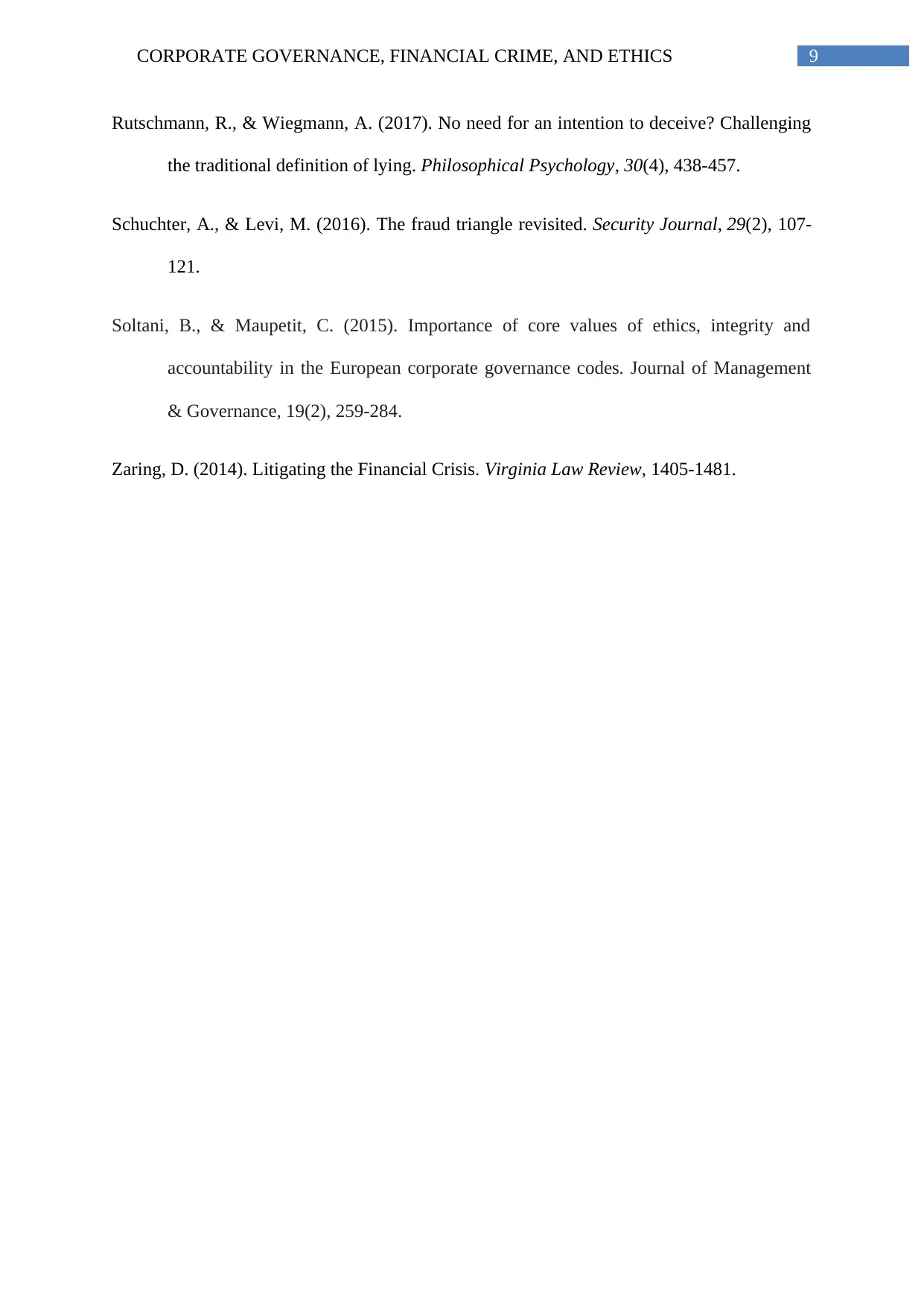
9CORPORATE GOVERNANCE, FINANCIAL CRIME, AND ETHICS
Rutschmann, R., & Wiegmann, A. (2017). No need for an intention to deceive? Challenging
the traditional definition of lying. Philosophical Psychology, 30(4), 438-457.
Schuchter, A., & Levi, M. (2016). The fraud triangle revisited. Security Journal, 29(2), 107-
121.
Soltani, B., & Maupetit, C. (2015). Importance of core values of ethics, integrity and
accountability in the European corporate governance codes. Journal of Management
& Governance, 19(2), 259-284.
Zaring, D. (2014). Litigating the Financial Crisis. Virginia Law Review, 1405-1481.
Rutschmann, R., & Wiegmann, A. (2017). No need for an intention to deceive? Challenging
the traditional definition of lying. Philosophical Psychology, 30(4), 438-457.
Schuchter, A., & Levi, M. (2016). The fraud triangle revisited. Security Journal, 29(2), 107-
121.
Soltani, B., & Maupetit, C. (2015). Importance of core values of ethics, integrity and
accountability in the European corporate governance codes. Journal of Management
& Governance, 19(2), 259-284.
Zaring, D. (2014). Litigating the Financial Crisis. Virginia Law Review, 1405-1481.
1 out of 10
Related Documents
Your All-in-One AI-Powered Toolkit for Academic Success.
+13062052269
info@desklib.com
Available 24*7 on WhatsApp / Email
![[object Object]](/_next/static/media/star-bottom.7253800d.svg)
Unlock your academic potential
© 2024 | Zucol Services PVT LTD | All rights reserved.





